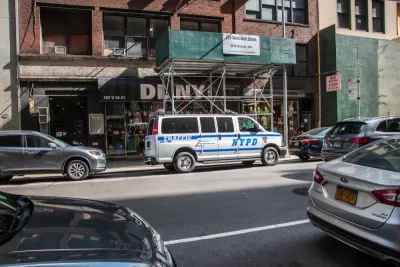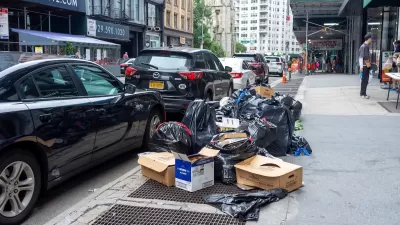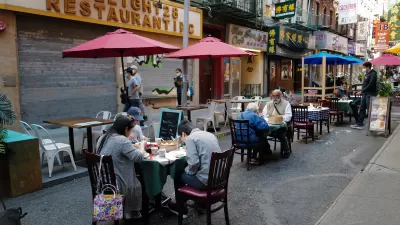Conversations about radically overhauling parking regulations in New York City, as the Big Apple is surprisingly behind the times when it comes to innovative approaches to parking.

Stephen Nessen reports that Ed Pincar, Manhattan borough commissioner of the New York City Department Of Transportation, has hinted at the potential demise of the city's long-standing parking regulation regime.
"New York City has about 3 million parking spaces, the majority of those cost drivers no money," explains Nessen for context. "But that could soon change. City officials are starting to recognize the costs and losses of giving away free curb space."
So in comments made to a public board meeting on the subject of residential parking permits, Pincap dropped this bombshell:
“If the last 10 years was focused on trying to develop a series of tools for safer streets, I think curb management is going to be the theme for the next 10 years,” Pincar said at Tuesday’s CB7 meeting. “Particularly as technology improves, it would be great if there were different spots on a block that are charged different amounts and maybe have different times.”
The conversation is in the earliest possible stages, but there's plenty of evidence to suggest that free parking isn't actually free, as noted by Nessen in the article. Still, the city has a long way to go to correct their parking regulations. "For the general public to accept the idea that street parking and curb use should be charged at a rate, will take a major cultural shift," writes Nessen to conclude the article.
FULL STORY: Is This The Beginning Of The End For Free Parking In NYC?

Alabama: Trump Terminates Settlements for Black Communities Harmed By Raw Sewage
Trump deemed the landmark civil rights agreement “illegal DEI and environmental justice policy.”

Planetizen Federal Action Tracker
A weekly monitor of how Trump’s orders and actions are impacting planners and planning in America.

The 120 Year Old Tiny Home Villages That Sheltered San Francisco’s Earthquake Refugees
More than a century ago, San Francisco mobilized to house thousands of residents displaced by the 1906 earthquake. Could their strategy offer a model for the present?

In Both Crashes and Crime, Public Transportation is Far Safer than Driving
Contrary to popular assumptions, public transportation has far lower crash and crime rates than automobile travel. For safer communities, improve and encourage transit travel.

Report: Zoning Reforms Should Complement Nashville’s Ambitious Transit Plan
Without reform, restrictive zoning codes will limit the impact of the city’s planned transit expansion and could exclude some of the residents who depend on transit the most.

Judge Orders Release of Frozen IRA, IIJA Funding
The decision is a victory for environmental groups who charged that freezing funds for critical infrastructure and disaster response programs caused “real and irreparable harm” to communities.
Urban Design for Planners 1: Software Tools
This six-course series explores essential urban design concepts using open source software and equips planners with the tools they need to participate fully in the urban design process.
Planning for Universal Design
Learn the tools for implementing Universal Design in planning regulations.
Clanton & Associates, Inc.
Jessamine County Fiscal Court
Institute for Housing and Urban Development Studies (IHS)
City of Grandview
Harvard GSD Executive Education
Toledo-Lucas County Plan Commissions
Salt Lake City
NYU Wagner Graduate School of Public Service





























